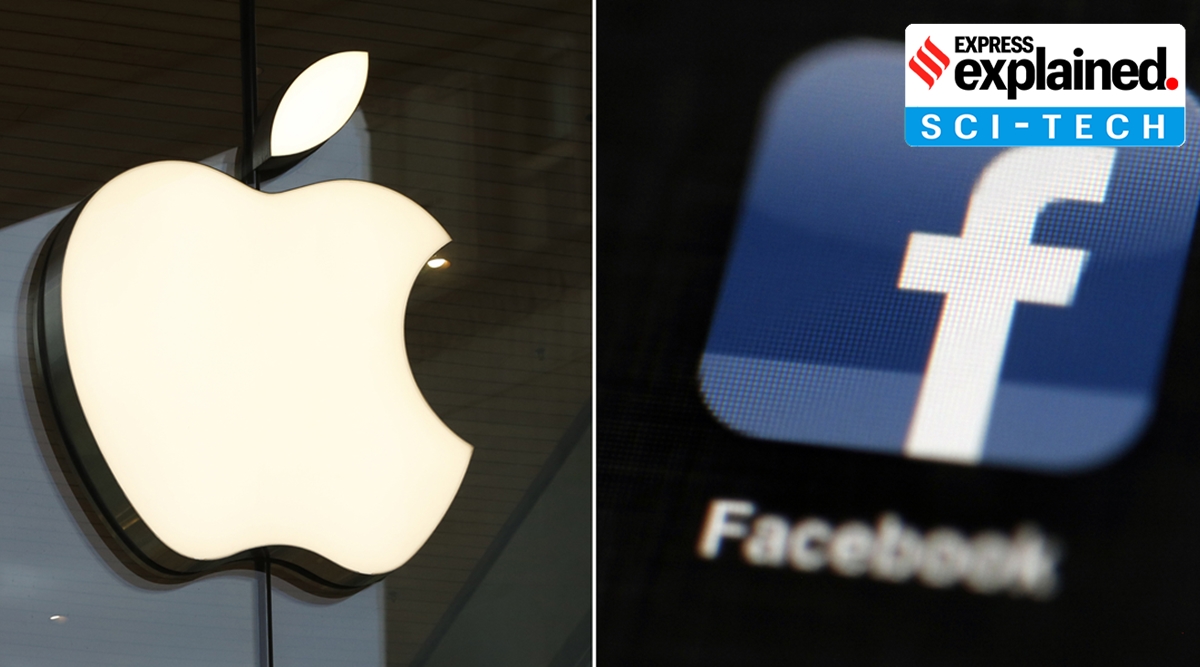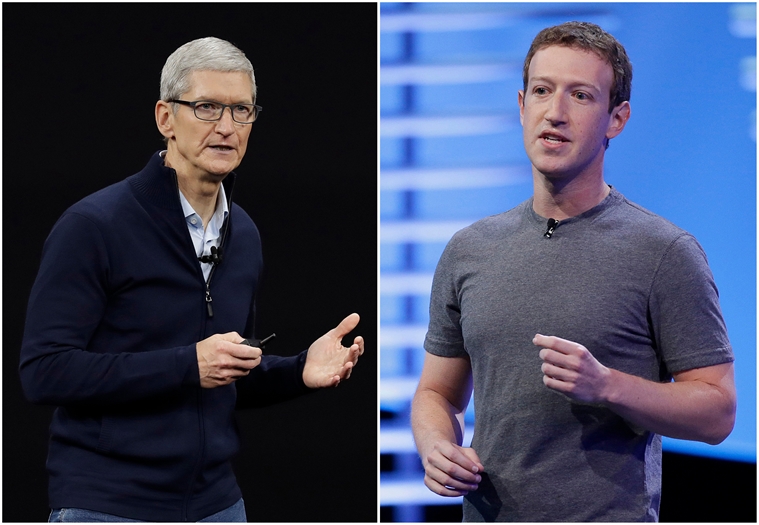This is not the first time that Apple and Facebook have clashed over the issue of privacy. Apple CEO Tim Cook has in the past been critical of Facebook’s business model.
Apple’s new privacy policy regarding tracking of user behaviour by apps has Facebook fuming. This week the social network took out two full-page advertisements in US newspapers such as Washington Post, The New York Times and Wall Street Journal saying the policy will harm ‘small businesses’ everywhere.
This is not the first time that Apple and Facebook have clashed over the issue of privacy. Apple CEO Tim Cook has in the past been critical of Facebook’s business model. Zuckerberg recently accused the iPhone maker of having a “stranglehold as a gatekeeper on what gets on phones,” and “stifling innovation”. We explain what this latest fight is all about.
So what is the change to Apple’s privacy policy?
Apple is adding more transparency in iOS 14. For one, Apple’s App Store now requires self-declared ‘privacy nutrition labels’ or little snippets which show the data being collected by apps. More importantly, Apple is cracking down on apps tracking user behaviour outside of their apps. This tracking behaviour is crucial for apps like Facebook, which have their business model built around being able to target advertisements on the basis of this data.
Apple’s new “AppTrackingTransparency” framework means a user has to grant explicit permission before an app can track them or access their “device’s advertising identifier”. The advertising identifier in each device is a unique id to serve targeted ads and it records what sites you are visiting, your interests, where you shop, where you wish to shop and so on. The new policy might mean that Facebook could no longer access this if users choose to block it.
According to Apple’s description page for developers, tracking as defined by them means “the act of linking user or device data collected from your app with user or device data collected from other companies’ apps, websites, or offline properties for targeted advertising or advertising measurement purposes. Tracking also refers to sharing user or device data with data brokers.”
An app which displays ads “based on user data collected from apps and websites owned by other companies”, as per Apple, is an example of tracking. For instance, when you visit Amazon and search for a chair, but don’t buy it and later see an ad for the same chair on Facebook, that’s an example of how tracking works. Sharing device location data or email lists with a data broker, sharing list of emails, advertising IDs, or other IDs with third-party advertising networks, are all considered similarly.
Why is Facebook unhappy?
Apple’s new policy could mean major trouble for Facebook, which relies on selling targeted ads to power its business models. In its full-page newspaper ad, Facebook argues that without personalised ads small businesses will suffer. “Forty-four per cent of small to medium businesses started or increased their usage of personalised ads on social media during the pandemic, according to a new Deloitte study. Without personalised ads, Facebook data shows that the average small business advertiser stands to see a cut of over 60 % in their sales for every dollar they spend.”
According to Facebook, while it will be impacted by the change, small businesses will be ‘devastated’.The ad notes, “More than 10 million businesses use our advertising tools each month to find new customers, hire employees and engage with their communities. Many in the small business community have shared concerns about Apple’s forced software update, which will limit businesses ability to run personalized ads and reach their customers effectively.”
What has been Apple’s response?
Apple CEO Tim Cook tweeted saying, “We believe users should have the choice over the data that is being collected about them and how it’s used. Facebook can continue to track users across apps and websites as before, App Tracking Transparency in iOS 14 will just require that they ask for your permission first.”
The tweet had a screenshot of iOS showing a message asking users whether they would want to continue letting Facebook track their activity outside of the app. There are two options: Ask App not to track, Allow. Cook’s screenshot also shows that Facebook can show information asking why users should continue to allow tracking.
In a statement Apple said it believe this is a simple matter of standing up for our users. “Users should know when their data is being collected and shared across other apps and websites — and they should have the choice to allow that or not. App Tracking Transparency in iOS 14 does not require Facebook to change its approach to tracking users and creating targeted advertising, it simply requires they give users a choice.” ? Follow Express Explained on Telegram
Why was WhatsApp unhappy with Apple’s nutrition labels?
WhatsApp claimed Apple’s new policy around privacy nutrition labels was unevenly implemented, given Apple’s own iMessage is pre-loaded onto iPhones and would technically be exempt from these labels.
In a statement to indianexpress.com, a WhatsApp spokesperson had said, “While providing people with easy to read information is a good start, we believe it’s important people can compare these Privacy Nutrition labels from apps they download with apps that come pre-installed, like iMessage.”
The statement added that “Apple’s template does not shed light on the lengths apps may go to protect sensitive information. While WhatsApp cannot see people’s messages or precise location, we’re stuck using the same broad labels with apps that do. We think labels should be consistent across first and thirty party apps as well as reflect the strong measures apps may take to protect people’s private information.”
A WhatsApp blog post listed all the data it collects and adding that it goes “to great lengths to build WhatsApp in a way that protects the privacy of our users and make them aware of this at the start of every conversation.”
Apple later clarified that all apps, including its own, will have to show the labels. However, users are not likely to see the same for the pre-loaded apps like iMessage as they don’t need to be downloaded from the App Store.
Source: Read Full Article




